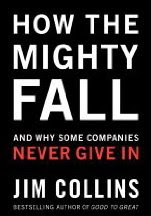 Okay – so let’s review. In Jim Collins’s book, How the Might Fall, he articulates five stages of organizational decline. The first stage is “Hubris Born of Success.” It’s arrogance about current practices and past success that leads to the second stage of decline–“Undisciplined Pursuit of More.” At this stage organizations engage in overreaching and outpace their ability to get the right people in the right seats on the bus. That brings us to the third stage of decline: Denial of Risk and Peril.
Okay – so let’s review. In Jim Collins’s book, How the Might Fall, he articulates five stages of organizational decline. The first stage is “Hubris Born of Success.” It’s arrogance about current practices and past success that leads to the second stage of decline–“Undisciplined Pursuit of More.” At this stage organizations engage in overreaching and outpace their ability to get the right people in the right seats on the bus. That brings us to the third stage of decline: Denial of Risk and Peril.
At the third stage, leaders begin making big bets on overreaching initiatives in the face of evidence that would suggest otherwise. Collins states, “The greatest danger comes not in ignoring clear and unassailable facts, but in misinterpreting ambiguous data in situations when you face severe or catastrophic consequences if the ambiguity resolves itself in a way that’s not in you favor.” He notes that great companies will experiment and test numerous ideas that may not ultimately pan out but they do not ignore the mounting data that would suggest the initiative will not work. Collins calls this “taking risks below the waterline”, asserting that you can survive a whole in the ship if its above the waterline but you will sink perilously to the bottom of the organizational ocean when you make decisions that blow holes below the waterline. Collins encourages leaders to ask three questions when making risky bets or decisions when faced with ambiguous or conflicting data:
- What’s the upside, if events turn out well?
- What’s the downside, if events go very badly?
- Can you live with the downside? Truly?
Some of the indicators that point to perilous decline include “deterioration in gross margins, current ratio, or debt-to-equity ratio” as well as decline in the “proportion of right people in key seats”, customer loyalty, stakeholder engagement, eroding team dynamics, blaming others or external factors, or obsessive reorganization. Collins says, “Reorganizations and restructurings can create a false sense that you’re actually doing something productive.” Reorganization can be a sign of denial and Collins says it’s like “responding to a severe heart condition or a cancer diagnosis by rearranging your living room.”
Question: What evidence or data are you ignoring? Why? What has been your response? Are your emotions or assumptions getting in the way? What needs to change?
 Okay – so let’s review. In Jim Collins’s book, How the Might Fall, he articulates five stages of organizational decline. The first stage is “Hubris Born of Success.” It’s arrogance about current practices and past success that leads to the second stage of decline–“Undisciplined Pursuit of More.” At this stage organizations engage in overreaching and outpace their ability to get the right people in the right seats on the bus. That brings us to the third stage of decline: Denial of Risk and Peril.
Okay – so let’s review. In Jim Collins’s book, How the Might Fall, he articulates five stages of organizational decline. The first stage is “Hubris Born of Success.” It’s arrogance about current practices and past success that leads to the second stage of decline–“Undisciplined Pursuit of More.” At this stage organizations engage in overreaching and outpace their ability to get the right people in the right seats on the bus. That brings us to the third stage of decline: Denial of Risk and Peril. 





